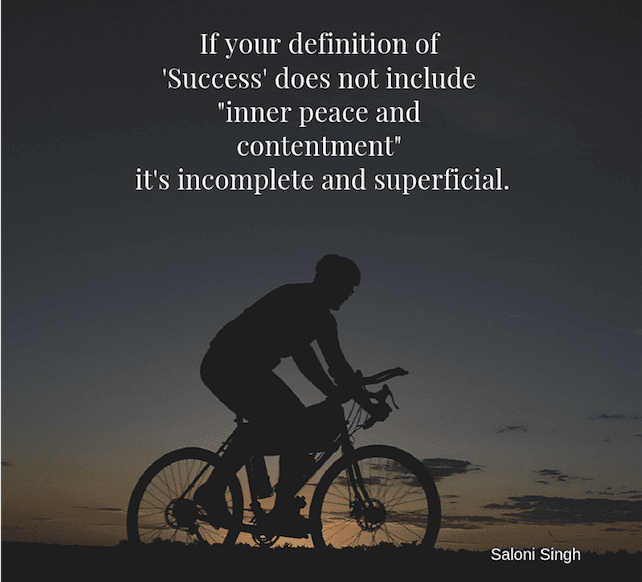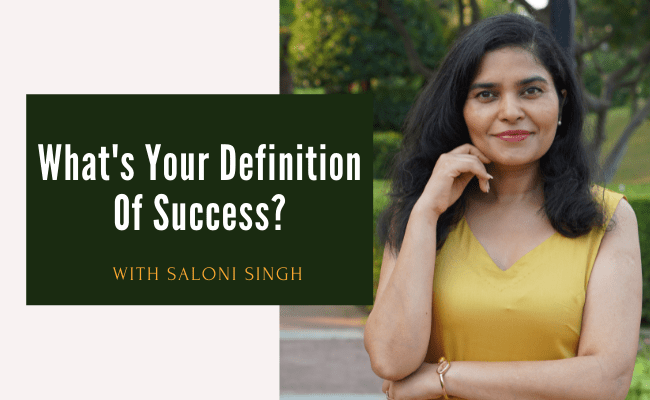“We got so busy in becoming successful, that we forgot to check what success means.”
What comes to your mind when you hear the word ‘success’ or ‘successful’?
Good income, good job, great business, big house, nice car, high status in society, overall comfortable life. Right?
I’m not guessing, that’s the answer I usually hear from my friends, clients and others every day.
Every one of us wants to be successful and happy in life and we want the same for our children. That’s good. That’s actually wonderful.
The only problem is – Do we know what a happy and successful life actually is?
Do we have a reference point for that?
How many people you meet or know who truly feel happy, successful and lead a contented, peaceful life? And not pretending to believe so.
I guess. Not many!
Because ‘The Good’ we have, is ‘Never good enough’. We end up in pursuit of wanting more and more, without even knowing how much more?
Our society equates possessions with happiness, status with success, consumption with richness and so we do the same.
Did we ever question these benchmarks of success and happiness?
We ask for evidence and proven data before we believe anything. Then how did we blindly follow society’s standards and ideas about success?
These ideas are so outdated and overrated.
Don’t believe me. Check for yourself.
There have been many studies and numerous research done on how materialism and consumerism undermine our quality of life and well-being to a great extent.
Time and time again, it has been seen in society and proved, that material success does not ensure emotional well-being, happiness, and satisfaction in one’s life.
“Tim Kasser, In his book The High Price of Materialism, offers a scientific explanation of how our contemporary culture of consumerism and materialism affects our everyday happiness and psychological health.”
Once we have sufficient food, shelter, and clothing, further material gains do very little to improve our well-being and happiness (many research have already proved this).
Kasser investigated further how people’s materialistic desires were related to their well-being and he found an interesting connection.
“People whose values center on the accumulation of wealth or material possessions face a greater risk of unhappiness, including anxiety, depression, low self-esteem, and problems with connection and intimacy – regardless of age, income, or culture.”
This is not Rocket science. If you pause from your daily rush of getting things done and sit still for a few moments; you can naturally start seeing the reality.
The hard reality is, wanting more and more is an endless pursuit. It keeps us unhappy and doesn’t let us be present in the moment, like being in a hamster wheel.
Once a human being’s basic needs are met (which can be defined by an individual), more stuff doesn’t raise their happiness level, rather it only raises their dissatisfaction.
As a society, we need to understand that the stuff, facilities, comfort, only fulfill the needs of the body, and not the emotional ‘self’.
Peace, fulfillment, the connection you desire are the needs of ‘self’, hence can never be fulfilled by the pursuit of more and more wealth and possessions.

A deep connection, contentment, and peace with the self and others, being comfortable in their own skin, doing work that one loves, enjoying harmony and love in relationships, Contributing to other’s lives; makes every human being feel great and probably successful in life.
What makes you truly joyous and content? Find for yourself.
Experience success for yourself. Do not let society and others define success for you.
What is your definition of success?
Share with me, I would love to know.
Remember, knowing who you are is your true potential.
This article was “originally posted on LinkedIn here”
https://www.linkedin.com/pulse/redefine-success-dr-saloni-singh/

